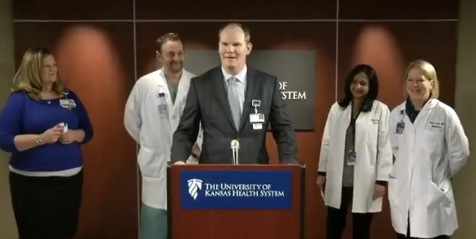
Ten persons were involved in a chain of five kidney transplants in two days this week at the University of Kansas Hospital in Kansas City, Kansas.
While KU Hospital does kidney transplants frequently, this is the first time it has done a 10-kidney chain in a few days. It is also the first one in the region, according to KU Hospital officials.
“Through the selfless and generous acts of five donors, we were able to complete a 10-kidney chain,” said Dr. Sean Kumer, physician vice president of operative services at KU Hospital. He performed the donor operations.
Dr. Tim Schmitt, director of transplantation at KU Hospital, said that without the generosity of kidney donors, they would not have been able to accomplish the transplants.
To help five patients come off the transplant list and get kidneys is quite a feat, he said.
“A lot of people went to work and accomplished this chain,” he said. “We could not have done it without the team.”
The transplant patients are all “doing great,” he said.
If not for one person who initially donated a kidney, this could not have happened, according to the KU physicians. The initial donor decided to give a kidney to a stranger. The donor had a friend who needed a kidney, and the friend received a kidney from another donor. The initial donor of this chain then decided to give a kidney to a stranger. Then other donors followed his example.
Amna Ilahe, director of the living donor program at KU, said a living kidney donation is one of the best gifts anyone can receive.
Sometimes potential donors’ kidneys are not compatible with a friend or family member because of differences in blood type of antibodies, so the kidney pair donation process is a safe alternative, she said.
“The incompatible donor gives to a complete stranger, and in return they receive a kidney for their loved one,” she said.
Five patients now will be able to avoid dialysis or get off dialysis through the generosity of the donors, said Dr. Diane Cibrik, medical director of kidney transplantation at KU Hospital.
“The real heroes are our donors,” Dr. Cibrik said. “It’s a great thing what they did.”
Jaime Bartley, R.N., organ transplant manager at The University of Kansas Hospital, said a national registry was used to search for possible matches. As more donors came forward, a chain was identified and created. Many department leaders met and prepared for these transplants, she added. There were unique challenges to preparing for and coordinating the transplants.
“Our nurses, doctors and multidisciplinary team members are truly honored to care for these patients throughout their evaluation, recovery and for years to come,” she said.
According to hospital officials, the donors and recipients of these kidneys came from different locations, including Wichita, Kansas, Independence, Missouri, and Manhattan, Kansas. There were two other patient locations that were not identified because of patients’ request for privacy.
